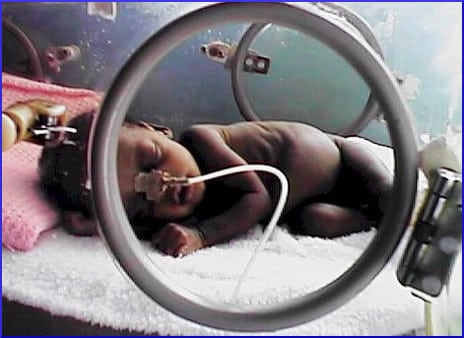 As Childhood Obesity News recently pointed out, deaf children are at greater risk of becoming obese, and that is only one aspect of a complicated five-way relationship between hearing loss, obesity, prematurity, antibiotics, and the passing along of somatic liabilities to descendents. One corner of the puzzle was described by Mathew Dearnaley for the New Zealand Herald:
As Childhood Obesity News recently pointed out, deaf children are at greater risk of becoming obese, and that is only one aspect of a complicated five-way relationship between hearing loss, obesity, prematurity, antibiotics, and the passing along of somatic liabilities to descendents. One corner of the puzzle was described by Mathew Dearnaley for the New Zealand Herald:
Children born prematurely not only risk becoming overweight adults, but they may also hand a legacy of obesity to their own offspring… And although early-born males are far more likely than premature females to pile on unhealthy fat in adulthood…a second generation of children is at greater risk of being overweight compared to other youngsters.
Researchers from the University of Auckland found that a child whose parent (of either gender) had been born prematurely, would have 12 to 21 percent more body fat than a child of full-term parents. Quoted in the story, Associate Professor Paul Hofman noted:
So an environmental insult has an impact in the next generation—it has a heritability about it which is quite scary.
This observation harks back to another recent Childhood Obesity News post, which discussed the work done by Sr. Edward Archer, who realized that depriving pregnant mice of exercise wheels would cause their grandchildren to be fat.
Returning to the topic at hand, there is a link between pre-term birth and obesity. There is also a link between pre-term birth and antibiotics. In 2009, Jeremy Laurance reported for The Independent:
An estimated 20,000 premature babies are treated each year with the powerful antibiotics, called aminoglycosides… Genetic specialists at the Institute of Child Health, who reviewed blood samples from over 9,000 children, found one in 500 had a genetic mutation that made them vulnerable to aminoglycosides.
Premature babies are given antibiotics to bolster their underdeveloped immune systems, but at a horrific price. Such miracle drugs as streptomycin have saved many lives, and have also proven to be ototoxic, poisoning to the ears. Otolaryngologist Anthony Ricci, Ph.D., explains how hearing functions correctly when…
…sound waves open ion channels within the sensory hair cells of the inner ear, allowing their conversion to electrical signals that eventually reach the brain.
But aminoglycosides kill those non-regenerating hair cells and cause deafness. Aminoglycoside use is incredibly widespread, since this type of antibiotic treats pneumonia, sepsis, peritonitis, mystifying infections of unknown origin, and bacterial diseases. It is used to prevent these disasters in kids who suffer from cancer, cystic fibrosis, and prematurity.
Back in 2009, it was believed that only one person in 500 has a genetic mutation making them susceptible to the danger of rogue aminoglycosides. Now, it appears that “an estimated 20-60 percent of all patients who receive these antibiotics suffer partial or complete hearing loss.”
To temporarily sum up: kids born premature already face increased obesity risk. If they are prophylactically dosed with antibiotics, that adds more obesity risk. The antibiotics might also cause deafness, and for a separate set of reasons, that disability adds more obesity risk. This is the simplest, straight-line scenario, but with so many variables and incidental factors, the landscape quickly becomes one of nightmarish confusion.
Next time: more about antibiotics and babies
Your responses and feedback are welcome!
Source: “Premature birth links to obesity, say researchers,” nzherald.co.nz, 11/23/13
Source: “Antibiotics Blamed for Child Deafness,” independent.co.uk, 02/05/09
Source: “New version of common antibiotic could eliminate risk of hearing loss, study finds,” med.stanford.edu, 01/02/15
Image by Mike Blyth

 FAQs and Media Requests:
FAQs and Media Requests: 











